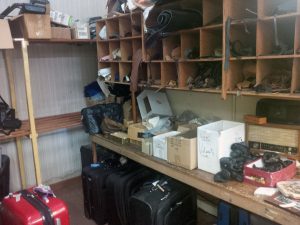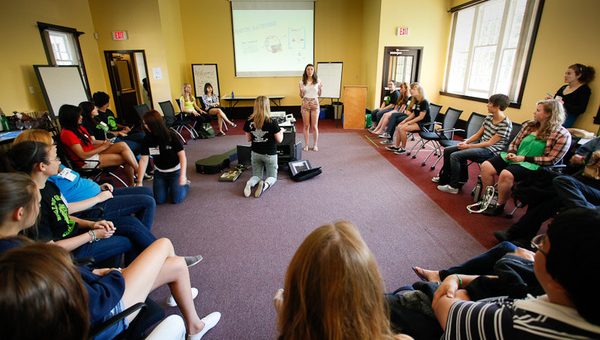Issues & Community Blog - Andrew Weaver: A Climate for Hope - Page 116
Congratulations to Squamish on being named Canada’s 5th Solar City
On Saturday June 25, Squamish became Canada’s 5th solar city. Initiated by the Canadian Solar Cities Project, Squamish joins four other British Columbia communities in meeting the ten criteria required for this designation. These ten criteria are:
- The municipality has a climate change plan with short-term and long-term targets and time-frames in place
- The municipality has a community energy plan in place
- The municipality has an energy plan in place for its own facilities
- The municipality has adopted targets for a proportion of total community energy demand to be met by renewable energy
- The municipality has established policies and incentives for solar electricity and solar thermal utilization for residential homeowners
- The municipality has established policies and incentives for solar electricity and solar thermal utilization for commercial ratepayers
- The municipality has a communication plan in place to build awareness of its renewable energy projects and policies
- The municipality has established policies for land use planning to promote and encourage energy efficiency
- Community renewable energy, energy efficiency technologies and green living demonstration projects are developed, supported and encouraged by the city to demonstrate these concepts to the public
- The municipality has policies in place to encourage district energy projects within its jurisdiction
 Canada’s first solar city was Dawson Creek which received its designation in June 2012. It was followed by Colwood (in March 2013), the T’Sou-ke Nation (in September 2013) and North Vancouver (in March 2014).
Canada’s first solar city was Dawson Creek which received its designation in June 2012. It was followed by Colwood (in March 2013), the T’Sou-ke Nation (in September 2013) and North Vancouver (in March 2014).
Squamish resident Matt Blackmon spearheaded the initial drive to Solar City status which was supported by numerous local residents, environmental groups and Squamish Council. The award was also made possible by the generous support of local realtor Andrew Laurie, seen to the right shaking hands with Bob Haugen, Executive Director of the Canadian Solar Cities project, and Matt Blackmon at the microphone on his left.
 Accepting the award — a stunningly crafted bronze sundial — on behalf of the District of Squamish was Mayor Patricia Heintzman. Councillor Karen Elliott was also in attendance as were numerous other local area residents and civic leaders.
Accepting the award — a stunningly crafted bronze sundial — on behalf of the District of Squamish was Mayor Patricia Heintzman. Councillor Karen Elliott was also in attendance as were numerous other local area residents and civic leaders.
I had the distinct honour of speaking at the event and took the opportunity to congratulate District of Squamish for their leadership.
A lot of lot exciting things are going on in Squamish these days. Carbon Engineering, a Canadian company that has developed innovative technology to create liquid fuels from atmospheric carbon dioxide, recently set up shop in Squamish. This potentially revolutionary technology also has the ability to capture and sequester human produced carbon dioxide directly from the atmosphere. I had the pleasure of touring the Squamish facility back in April of this year.
In addition, UBC’s Clean Energy Research Centre, the District of Squamish, the Squamish Nation, Newport Beach Developments Limited Partnership, and Carbon Engineering recently signed an agreement to explore ways in which a centre for clean energy research and education could be established on the waterfront brownfield industrial site located at the head of Howe Sound. This exciting opportunity would mean the creation of a satellite campus of UBC in Squamish focused exclusively on Cleantech education, research, and development. It’s precisely this type of investment in innovation that I have been advocating for since the time I got elected as it is critical in terms of positioning British Columbia at the forefront of tomorrow’s economy.
Ironically, as Squamish takes bold steps to lead British Columbia through innovation towards a 21st century economy, it is having to deal with the unwanted Woodfibre LNG proposal that would be located a stone throw away from the town. The fact that the Squamish Council voted against this project; the fact that West Vancouver and Lion’s Bay Councils voted against it; the fact that it goes against their district’s branding as Hardwired for Adventure; the fact that it undermines Squamish’s efforts to become a leader in cleantech seems utterly lost on the BC Liberals. For in their desperate and reckless quest to land an LNG plant to fulfill their irresponsible election promises all that matters is “getting to yes”. But at some point, you need to ask what the question is.
Let’s get to yes on Squamish becoming a centre for Cleantech education, research and development while saying no to doubling down on chasing the losing proposition of LNG.
Celebrating Local Businesses in our Community – Godfrey’s Luggage & Leather Repairs & Sales
Myrna Boyle has been working at Godfrey’s Luggage & Leather Repairs & Sales for 50 years. She can fix about 15 bags (and wallets, brief cases, golf bags) a day and, to the delight of her customers, doesn’t plan on stopping any time soon.
 I brought a broken suitcase with me to our meeting, as I have done many times before, and got a ticket instructing me to pick it up in a week’s time. “Unless there is a rush?” she checked, “Any travel plans?” Mrs. Boyle’s work is very reasonably priced, for her to fix the zipper on this bag it will run me about $16. Other repairs are more extensive, of course, but luggage that would otherwise be thrown out can be made good as new in Mrs. Boyle’s capable hands. “Some take a long time, you have to do it right.” The odd item is too far gone, she says, and she doesn’t hesitate let people know if it is. “For other things I’ll say ‘no, I don’t think you should spend the money on that.’”
I brought a broken suitcase with me to our meeting, as I have done many times before, and got a ticket instructing me to pick it up in a week’s time. “Unless there is a rush?” she checked, “Any travel plans?” Mrs. Boyle’s work is very reasonably priced, for her to fix the zipper on this bag it will run me about $16. Other repairs are more extensive, of course, but luggage that would otherwise be thrown out can be made good as new in Mrs. Boyle’s capable hands. “Some take a long time, you have to do it right.” The odd item is too far gone, she says, and she doesn’t hesitate let people know if it is. “For other things I’ll say ‘no, I don’t think you should spend the money on that.’”
Mrs. Boyle also has a contract with West Jet and helps them repair items damaged in transit, as bags often drop into the luggage carousal in a different state than when their owner last saw them at the airport baggage drop-off. She also repairs luggage for other airlines as well.
 Richard Godfrey started the business in the mid ‘40s and Mrs. Boyle started working as his assistant 20 years later in the mid ‘60s. When Mr. Godfrey died suddenly in 1976 Mrs. Boyle took over. “Mr. Godfrey also used to make leather badges for the police and fire departments. He hadn’t taught me how to do it, but when he died I took over and had to learn quickly so I could support his family.”
Richard Godfrey started the business in the mid ‘40s and Mrs. Boyle started working as his assistant 20 years later in the mid ‘60s. When Mr. Godfrey died suddenly in 1976 Mrs. Boyle took over. “Mr. Godfrey also used to make leather badges for the police and fire departments. He hadn’t taught me how to do it, but when he died I took over and had to learn quickly so I could support his family.”
Police badges aside, the business hasn’t changed much in the last 70 years. They moved from central downtown to their current location in 1988 and recently bumped their opening hour from 8:30 to 9:30am – “I thought I might like to sleep in” – other than that it has been business as usual.
An assistant comes in for two hours a week to help tidy up and manage merchandise, but Mrs. Boyle manages the shop and does all the work herself. “I just love her, she’s excellent,” she said of her assistant.
Mrs. Boyle has dedicated clients who have been coming to her for years. “I have such lovely older clients. They bring me cookies and say ‘I hope you never close.’ I’m as old as they are!”
 Thinking back to the time I lost track of the engagement ring I was hiding from my soon to be wife in our luggage, I asked Mrs. Boyle if she has every found anything interesting in the bags people bring in to be fixed. Without missing a beat she laughed and described the rather intimate toy she once found in a bag brought in by a rather “demure” lady. “Oh, I didn’t say anything. I just discretely put it in one of the pockets,” she explained with a chuckle.
Thinking back to the time I lost track of the engagement ring I was hiding from my soon to be wife in our luggage, I asked Mrs. Boyle if she has every found anything interesting in the bags people bring in to be fixed. Without missing a beat she laughed and described the rather intimate toy she once found in a bag brought in by a rather “demure” lady. “Oh, I didn’t say anything. I just discretely put it in one of the pockets,” she explained with a chuckle.
Mrs. Boyle doesn’t have a website, or computer for that matter, but the landline in her shop works just fine and she’s happy to accommodate clients who drop by with repair jobs. She has some luggage (new and consignment) for sale in store, and said she used to sell other Canadian leather goods but stopped when her supplier went out of business. “If I can’t get the good Canadian ones I don’t want any at all.” I know there are a lot of talented people in Victoria who make leather goods so I asked if she would be willing to restock if a local designer wanted to display some items. “I would be most interested!” she said.
 “It breaks my heart to see those little businesses close,” Mrs. Boyle said as we chatted about all the local businesses we have seen come and go in Victoria. Godfrey’s Luggage & Leather Repairs & Sales speaks to a historic value of repairing, reusing, and caring for ones belongings. Though society’s buying habits have become increasingly disposable, Godfrey’s endurance when many other small businesses have closed over the last 70 years shows that value has not been lost.
“It breaks my heart to see those little businesses close,” Mrs. Boyle said as we chatted about all the local businesses we have seen come and go in Victoria. Godfrey’s Luggage & Leather Repairs & Sales speaks to a historic value of repairing, reusing, and caring for ones belongings. Though society’s buying habits have become increasingly disposable, Godfrey’s endurance when many other small businesses have closed over the last 70 years shows that value has not been lost.
Godfrey’s is open Tuesday to Saturday from 9:30am to 5:00pm. If you have any purses, wallets, luggage, or golf bags that need repairing give Mrs. Boyle a call at 250-388-5262 or pop in to see her at 2508 Douglas Street, Victoria, V8T 4M1.
Celebrating youth in our community – Nikki Frazer
This is the 24th in our series of stories celebrating the outstanding accomplishments of youth in our community. These inspirational young adults are enriching our lives with their passion and commitment to the betterment of society.
Nikki Frazer
 While reading the Oak Bay News a couple of months ago, I came across an article about Nikki Frazer. Nikki, a grade 12 student at Oak Bay High School, had just been announced as a finalist in the Start Something with Alesse scholarship contest thanks to her business proposal: Bee-utiful Fashion to Save the Bees. Her idea was to create an online store selling mainly bee-related fashion items, as well as ethically-sourced beeswax accessories like soap and candles, in order to raise money and awareness for the declining native bee population here in Canada – an issue she had become aware of after watching a TED Talk on the plight of bees.
While reading the Oak Bay News a couple of months ago, I came across an article about Nikki Frazer. Nikki, a grade 12 student at Oak Bay High School, had just been announced as a finalist in the Start Something with Alesse scholarship contest thanks to her business proposal: Bee-utiful Fashion to Save the Bees. Her idea was to create an online store selling mainly bee-related fashion items, as well as ethically-sourced beeswax accessories like soap and candles, in order to raise money and awareness for the declining native bee population here in Canada – an issue she had become aware of after watching a TED Talk on the plight of bees.
After being selected to the top 10 finalists from more than 1,500 entries across Canada, Nikki’s proposal received over 1,000 votes in just 3 weeks. Nikki eventually finished 3rd in the For-Profit Category, helping to bring a renewed attention to this important issue along the way.
 Inspired by her passion and ingenuity, I invited Nikki to be a part of our celebrating youth series. After meeting with Nikki at my constituency office last month it was clear that that Oak Bay News article was just a small sample of the passion and determination she possesses.
Inspired by her passion and ingenuity, I invited Nikki to be a part of our celebrating youth series. After meeting with Nikki at my constituency office last month it was clear that that Oak Bay News article was just a small sample of the passion and determination she possesses.
Born in Kamloops but raised in Victoria, Niki attended Sir James Douglas Elementary and Monterey Middle School before ending up at Oak Bay High. Currently in her final year of High School, Nikki is the definition of an all-around-student. She is currently taking a full course load, including Calculous, AP English, Chemistry and Band, as well as serving on Oak Bay Student Council, the Community Leadership group, and the Oak Bay High Interact Club, of which she is Vice President, all while maintaining an exceptional academic standing. While she has a passion for classical literature and creative writing, Nikki’s favorite areas are mathematics and theoretical physics. In fact, she will be attending the University of Toronto next fall to do a double major in mathematics and physics.
 Outside of school, Nikki volunteers with the UVic Seniors Program, where she teaches seniors how to use social media outlets such as Facebook, Gmail and Twitter, and with Disaster Aid Canada, where she organized over 100 Disaster Relief Kits to be sent out to disaster areas, such as Nepal. Through her work with Disaster Relief Canada Nikki also organized a team of youth volunteers for the Soap for Hope program. Once a week during the summer, and once a month during the school year, the group gets together to collect mini soap, shampoo and conditioner bottles donated from local hotels in order to create hygiene kits for local shelters and international organizations.
Outside of school, Nikki volunteers with the UVic Seniors Program, where she teaches seniors how to use social media outlets such as Facebook, Gmail and Twitter, and with Disaster Aid Canada, where she organized over 100 Disaster Relief Kits to be sent out to disaster areas, such as Nepal. Through her work with Disaster Relief Canada Nikki also organized a team of youth volunteers for the Soap for Hope program. Once a week during the summer, and once a month during the school year, the group gets together to collect mini soap, shampoo and conditioner bottles donated from local hotels in order to create hygiene kits for local shelters and international organizations.
 When not volunteering, Nikki has delivered newspapers for the Times Colonist (a job she discontinued last month to allow more time for exam studying) and has worked with the SMUS International Student Program, as a Canadian Ambassador for Japanese students, and with the Victoria International Education Centre (VIEC), assisting in ESL Classroom lessons and acting as a tour guide during fieldtrips.
When not volunteering, Nikki has delivered newspapers for the Times Colonist (a job she discontinued last month to allow more time for exam studying) and has worked with the SMUS International Student Program, as a Canadian Ambassador for Japanese students, and with the Victoria International Education Centre (VIEC), assisting in ESL Classroom lessons and acting as a tour guide during fieldtrips.
While Nikki is clearly an exceptionally accomplished and determined young woman, perhaps what struck me most in my meeting with her was how modest and humble she was about her accomplishments. It was clear that she truly enjoys and believes in every project she has been involved with, and that her passion for community involvement is a key driving force behind her many endeavors. In fact, it was this humble nature that had her casually skimming over one of her more personal, but equally impressive, accomplishments: Nikki recently earned her Black Belt in Traditional Japanese Okinawan Shorin Ryu Karate.
 Beginning her Karate practice learning Shotokan Karate, the more common Karate form practiced in the Western Hemisphere, Nikki won two competitions and earned her 4th degree Brown Belt before switching over to the more traditional Shorin Ryu form. She currently trains under Sensei Masanbou Kikukawa, dedicating 12 hours a week to her Shorin Ryu practice.
Beginning her Karate practice learning Shotokan Karate, the more common Karate form practiced in the Western Hemisphere, Nikki won two competitions and earned her 4th degree Brown Belt before switching over to the more traditional Shorin Ryu form. She currently trains under Sensei Masanbou Kikukawa, dedicating 12 hours a week to her Shorin Ryu practice.
Shorin Ryu has a strong emphasis on patience and respect. While practitioners train their bodies to be able to defend themselves physically, they also train their minds to never have to —instead developing the strength of mind to walk away from a fight, unless given no other choice.
 While listening to Nikki talk about Shorin Ryu it became clear to me that the patience, respect and strength of mind that she has developed through her practice has benefited her in all aspects of her life and will continue to benefit her throughout her future. In fact, she is already looking for a Sensei in Toronto that share’s Sensei Kikukawa’s philosophies so that she can carry on her practice while at U of T. And when I asked her about her career goals for the future, she said she would like to be in a Management position at a physics company and have her own Dojo (Karate School).
While listening to Nikki talk about Shorin Ryu it became clear to me that the patience, respect and strength of mind that she has developed through her practice has benefited her in all aspects of her life and will continue to benefit her throughout her future. In fact, she is already looking for a Sensei in Toronto that share’s Sensei Kikukawa’s philosophies so that she can carry on her practice while at U of T. And when I asked her about her career goals for the future, she said she would like to be in a Management position at a physics company and have her own Dojo (Karate School).
Nikki’s humble nature, strength of mind and passion for life will no doubt lead her to a brilliant future. And one day Shorin Ryu students may be vying for the chance to practice under Sensei Frazer.
British Columbia moving from Climate Leader to Climate Laggard
In 2013 representatives from California, Washington, Oregon, British Columbia came together to form the Pacific Coast Collaborative (PCC) and sign a non-binding climate and energy action plan. Yesterday, in San Francisco they renewed their commitment to the Pacific North America Climate Leadership Agreement and Action Plan, claiming to have updated their previous agreement with increasingly bold goals that reflect the need for decisive climate action.
Unfortunately, from a British Columbia perspective, the press conference was high on political rhetoric and short on any real action.
Minister Polak suggested that there weren’t many easy places to look for further greenhouse gas reductions because we already have the lowest rate in the country – this is false on both accounts:
(i) More than 40% of our household GHG emissions and over 30% of BC’s emissions come from transportation, a sector with enormous emission-reducing potential.
(ii) By 2014 and relative to 1990 levels, five provinces have actually realized net overall greenhouse gas reductions: Nova Scotia (-17%), New Brunswick (-9%), PEI (-8%), Quebec (-7%) and Ontario (-6%).
BC has the third highest overall increase: Saskatchewan (+68%), Alberta (+56%) and British Columbia (+19%). BC is only 4th best in terms of per capita emissions (behind Quebec, PEI and Ontario).
It is beyond any doubt that the current government intends to ride the ambition of the previous Campbell administration. Since Premier Clark has taken the helm, the current government has done virtually nothing to advance any serious climate action and emissions have gone up as a direct consequence.
In the press release accompanying the PCC signing, our Minister states: “We will build on momentum gained from the Paris agreement by not only continuing to reduce emissions at home, but also by helping other countries transition away from dirty fossil fuels.” What this means is that instead of climate action, the BC Liberals will continue to chase a hypothetical LNG industry. In so doing, they are ignoring the words of more than 90 international scientists who recently pointed out in an open letter that it makes no sense from a greenhouse gas reduction perspective. Climate policy, of course, gets in the way of the LNG pipedream.
So while California introduces Cap and Trade legislation, in BC we repeal our legislation. While Ontario and Alberta launch ambitious climate action plans, we watch our carbon tax become less and less affective. This is what our climate record look like over the past few years:
- The Clean Energy Act was amended to exclude emissions for liquefaction in LNG industry;
- The Pacific Carbon Trust was shut down;
- Carbon tax increase were halted;
- Cap and Trade enabling legislation (designed to bring big point source emitters in with California) has been repealed;
- We have a new Greenhouse Gas Industrial Reporting and Control Act that introduces an “emissions intensity” framework that is more about supporting an LNG industry than limiting emissions;
- The LiveSmart BC program has essentially shut down;
- Emissions have gone up year after year;
- We will not reach our legislated 2020 GHG reduction target.
As a province we can no longer claim climate leadership. Wishing it were so does not mean it is so. Our government may have reaffirmed their commitment to the PCC action plan, but their inaction over the last three years indicates that they do not take the agreement seriously.
As other provinces are stepping up and getting more ambitious, the B.C. Liberals seem content to coast as we fall behind. On top of that, if the LNG sector expanded the way the government has promised our GHG emissions would skyrocket.
Addressing climate changes requires direct action, not more promises, targets, political posturing and rhetoric.
Responding to Pacific Coast Climate Leadership Action Plan Update
Today, in San Francisco representatives from California, Washington, Oregon, British Columbia signed the already announced Pacific North America Climate Leadership Agreement and Action Plan. The press conference, oozing with self-congratulation and political rhetoric from our Minister of Environment, can be viewed online. Our Minister of Environment’s comments were, in my view, embarrassing. In her remarks the Minister continued to try and take credit for the Campbell administration’s past climate leadership. And the accompanying press release states:
For those needing a translation this means “we will continue our desperate attempt to land a hypothetical LNG industry and in so doing ignore the words of more than 90 international scientists who point out that this makes no sense from a greenhouse gas reduction perspective.” Climate policy, of course, gets in the way of the LNG pipedream. And so while California introduces Cap and Trade legislation, BC repeals our legislation. Here’s what climate leadership looks like under Today’s BC Liberals (who are in my humble opinion nothing more than yesterday’s Harper Tories):
- The Clean Energy Act was amended to exclude emissions from liquefaction in LNG industry;
- The Pacific Carbon Trust shut down;
- Carbon tax increase stops;
- Cap and Trade enabling legislation (designed to bring big point source emitters in with California) has been repealed;
- We have a new Greenhouse Gas Industrial Reporting and Control Act that introduces an “emissions intensity” framework straight out of Alberta’s policy;
- The LiveSmart BC program has essentially shut down;
- Emissions have gone up year after year.
Below is the media statement I released today. The banner above says it all.
Media Statement
Media Statement: June 1st, 2016
Weaver Responds to Pacific Coast Climate Leadership Action Plan Update
For Immediate Release
Victoria B.C. – “The B.C. Liberals are in no position to claim climate leadership. While they reaffirmed their commitment to the PCC action plan today, their inaction over the last three years indicates that they clearly do not take the agreement seriously,” Andrew Weaver, MLA for Oak Bay – Gordon Head and Leader of the B.C. Green Party, said of the 2016 Pacific Coast Climate Leadership Action Plan signing in San Francisco.
The Pacific Coast Collaborative (PCC) is a partnership between California, Oregon, Washington and British Columbia, who signed a non-binding climate and energy action plan in 2013. Today’s renewed commitment is said to update their previous agreement with increasingly bold goals that reflect the need for decisive climate action.
“At today’s signing Mary Polak suggested that there are not a lot of places to look to further reduce greenhouse gas emissions in B.C. because we already have the lowest rate in the country – she is false on both accounts. 40% of our household GHG emissions come from transportation, a sector with great emission-reducing potential, and Quebec is the province with the lowest per capita emissions in Canada.”
“These are the same talking points we heard in 2013. As other provinces are stepping up and getting more ambitious, the B.C. Liberals seems content to coast as we fall behind. On top of that, if the LNG sector expanded the way the government has promised our GHG emissions would skyrocket and there is no guarantee it would result in reductions anywhere else.”
“Addressing climate changes requires direct action, not more promises and photo ops.”
-30-
Media Contact
Mat Wright
Press Secretary
Email: Mat.wright@leg.bc.ca
Cell: 250 216 3382








